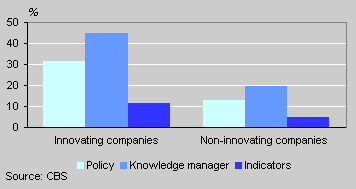Half of all large companies have corporate knowledge policy

One quarter of companies in the Netherlands had appointed a knowledge manager in 2002. Large companies are most active in the area of knowledge management.
Systematic storage of knowledge
The idea behind knowledge management is to make knowledge that is present in a relatively small group accessible for larger groups of people in the organisation. To be able to do this, knowledge has to be stored systematically in databanks and made available to others via media that are easy to use. Knowledge can cover aspects in different levels of the organisation: from knowledge about the production process to knowledge about market strategy; knowledge on practical matters such as how can we ensure that our machines work most efficiently, as well as theoretical knowledge and human resources knowledge: if I have a question who can answer it?.
Knowledge managers mainly in large companies
Forty-five percent of companies with 250 or more employees had a manager or department responsible for management of knowledge within the organisation. For smaller companies (10 to 50 employees) this was 22 percent.
Knowledge management by company size, 2002

Many companies lack knowledge strategy
In 2002 one in four companies had either a manager or a department who was responsible for knowledge, and one in six had set out a policy or strategy for knowledge management. Only few companies are as yet in a position to measure the success or the advantages of implementing knowledge management. This may vary from the evaluation of achievements of individual employees to indicators for output of departments. Six percent of the smaller companies and 12 percent of large companies had indicators in this respect.
Services sector most active
Companies in the services sector are more active in the area of knowledge management. Eighteen percent of companies in this sector has developed a knowledge management policy, compared with 15 percent of manufacturing companies and only 12 percent of companies in other sectors. Fewer of the latter companies had also appointed a knowledge manager or set up a special knowledge department.
Knowledge management by sector, 2002

Within the services sector the computer service bureaus are clearly in the lead in the field of knowledge management: half of these bureaus already have a manager or department responsible for knowledge. Sectors where hardly any companies have a policy in this respect include the textile and leather industry, and retail trade and repairs.
Nearly half of innovating companies have a knowledge manager
Innovating companies play a leading role in the knowledge-based economy. Unsurprisingly, these companies do more with the knowledge at their disposal. For example, 45 percent of innovating companies have a manager or department responsible for knowledge. For the non-innovating companies this is only 20 percent.
Many companies not yet actively implementing knowledge management in 2002 did plan to do so in 2003 and 2004.
Knowledge management and innovation, 2002

Effect of knowledge management hardly measured yet
In 2002 6 percent of companies had indicators to measure the effect of knowledge management; 16 percent of companies were planning to introduce such indicators in 2003 or 2004. Most companies planning to introduce these indicators are also developing a policy for knowledge management.
Martje Roessingh
Source: Kennis en economie 2004 (Knowledge and the economy, forthcoming, in Dutch with English summary).